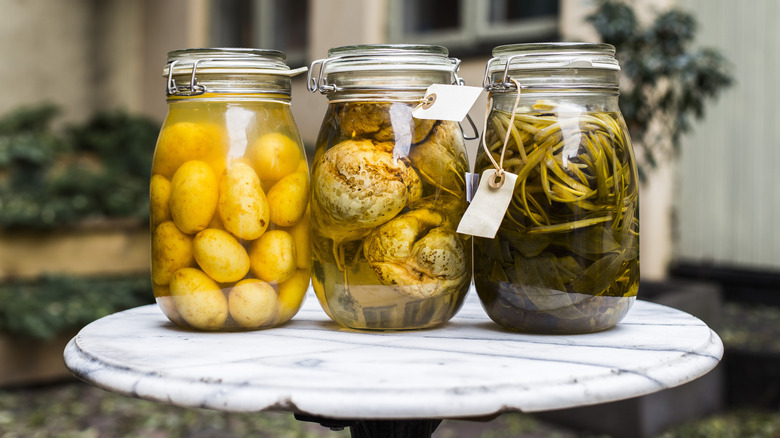Why Noma Uses Fermented Ingredients In So Many Of Its Dishes
Internationally acclaimed Noma attributes fermentation to one of the special attributes that makes their restaurant unique. "Fermentation has become part of the heartbeat of what Noma is," Noma's Director of Fermentation Jason White told Audi; he believes fermentation can change the world. Noma regards fermentation so highly that they have an entire test kitchen devoted to researching new processes and have shared some of their discoveries for aspiring chefs to try at home.
While those familiar with fermentation might think of sourdough or kimchi, Noma demonstrates that fermented ingredients can take simple recipes to new heights: think kombucha-flavored syrup or stir-fry made with fermented fish sauce (per Revolution Fermentation). As Noma Chef David Zilber began to compile ideas for a cookbook, he realized fermentation is a core element of the restaurant's identity — a tool that could be used by anyone in kitchens around the world (via Mindfood).
Fermentation used to belong to ordinary people, Zilber told Foodism, and culinary traditions passed fermented recipes from one generation to the next. Nu Sci Magazine traces fermentation to more than 9,000 years ago when residents in a Chinese village fermented food in pottery jars so that decomposition might result in koji, bread, miso, and even brews. So how did fermentation become essential to Noma's menu?
When necessity leads to invention
In the introduction of The Noma Guide to Fermentation, Noma Chef René Redzepi recalls the restaurant's early days, when the team had to find ingredients to store in the kitchen before long, cold winter days. One of Noma's foragers presented ramson buds; once pickled, these small caper-looking flowers delivered a big surprise. They were salty, acidic, and easily found in areas surrounding the restaurant. Soon, other ingredients were used as fermentation test cases. Pickled gooseberries delighted the chefs and ignited their curiosity to better understand how fermentation might enhance other culinary experiences.
Redzepi asserts, "Fermentation isn't responsible for one specific taste at Noma — it's responsible for improving everything" (via Wired); that's why brine made from lacto-fermented mushrooms can be found seasoning main dishes and beverages. If you've tried to make pickles or sauerkraut at home, maybe you, too, understand the magic of watching culinary transformation take place.

